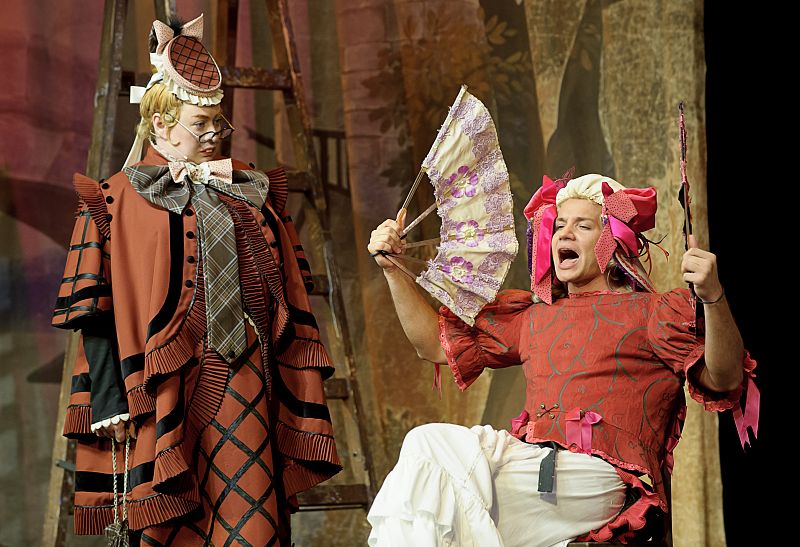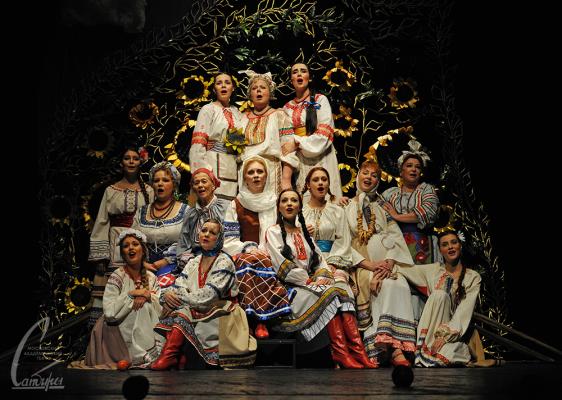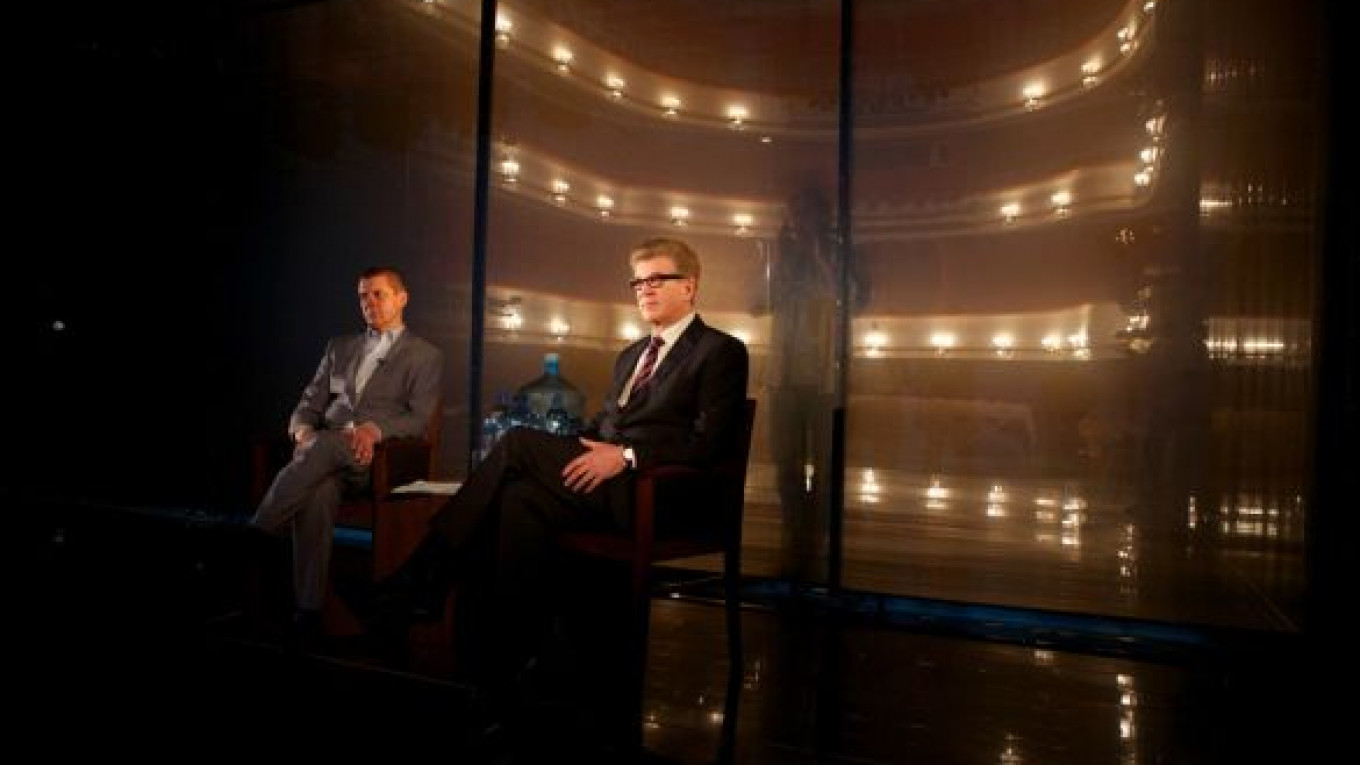INTERVIEW: Anna Prosvetova speaks to Sergey Lavrov about ONLINE TEATR project
In January 2015 a new resource, ONLINETEATR.COM, was launched at the initiative of CJSC Synterra Media. It is the first website in Russia broadcasting current performances from Moscow theatres on a regular basis. Regardless of their place of residence, the users of this website are able to see the plays on the same day as the audience in a Moscow theatre. Anna Prosvetova spoke to Sergey Lavrov, Special Projects director at CJSC Synterra Media, about the ONLINE TEATR (ONLINE THEATRE) project.
Anna Prosvetova: Sergey, thank you for this interview. I think Online Teatr is an interesting project and our readers would be glad to know more about it. Could you tell us how did this project come about?
Sergey Lavrov: Similar ideas have been in the cultural air in Moscow and in Russia in general for some time already. There were several companies that organised similar broadcasts from time to time, and their activity depended on various factors, from finance to technical issues. Our company, I believe, is the first one who started broadcasting theatre performances on a regular basis. I think this is the main feature of our project. The idea was there, but the most important was to organise the process. We have been already working in this area, broadcasting sport events, including Olympics, music events, such as Eurovision, or international forums and conferences. All these projects have been done mostly for the television, and later we started doing similar broadcasting of sport events for the Internet audience. I knew some people in the theatre environment and was interested in doing something similar with them.
We have been doing it on a regular basis for almost two years already, mostly through the theatres’ websites, and wanted to create a special portal for the audience, where they would be able not only to watch the performances, but also to have relevant information, images and short videos from performances, information about actors and a theatre. At the same time, people are able to watch these performances not only on our main site, but also on websites of our theatre-partners, including Vakhtangov, Satire and Mayakovsky theatres, and on websites of other companies who would like to participate in this initiative.

Mademoiselle Nitush at Vakhtangov Theatre / Courtesy of Online Teatr
AP: I have seen recordings of theatre performances on various other websites. What is the main difference between your project and these websites?
SL: One may find recordings of theatre performances from different years in the Internet. However, apart from working legally with our theatre partners, we are presenting a unique opportunity to the viewers to watch a live broadcast of a performance directly from the theatre. We do not publish any recordings of past performances, but give people the chance to see what is going on in the theatre at this same moment.
It is very important to save the memory of previous performances and to watch our great artists, such as Papanov or Mironov, performing on a stage. But our project has a different goal. I am myself a theatre-lover, and try to see as many performances as possible. And even after all these years my heart aches every time I see the curtain opens at the beginning of the play. I think it is important to present this opportunity to people who live in Kazan, Perm, Vladivostok, New York or London to see plays life from the best Moscow theatres. At the same time, we have received good feedback from the Moscow audience. There are situations when the cast of a certain play is changing or there are no tickets left in the box office, and people are happy to have this opportunity to watch the performance despite any obstacles.

I have heard many critics saying that the real theatre could not be replaced by the TV version of a performance. We understand it very well and did not even think about doing it while introducing our project. Our cameras are located in the best locations around the auditorium, and the viewer sees the same performance as the rest of the audience in the theatre. There is no intention to present a better view or to take a close-up of an actor, as it is done in the TV versions of plays, which sometimes look artificial, presenting the cameraman’s point of view. We want the online audience to see the actual performance, as if they are sitting in the auditorium in Moscow. Moreover, watching the online broadcasting people could see some special events or celebrations taking place during a certain performance, making them immediate participants of the life in the theatre.
AP: How do you choose the performances for broadcasting? Is it something a theatre would like to show?
SL: Our partners choose the performances they would like to broadcast, and we provide them with the technical support. Every month they send us a schedule of their performances and we post it on our website. The choice of a play also depends on copyright limitations or its novelty. May be it is a premier and the theatre would like to wait for a while releasing it online.

Wedding in Malinovka, Satire Theatre / Courtesy of Online Teatr
AP: Could you tell us about the feedback from the audience about the project?
SL: We understand that the theatre audience is smaller than the cinema one, and we try to keep in touch with our viewers and understand their needs. We are interested in hearing feedback from our audience, also reviewing statistics regarding the geography of our audience very closely. Sometimes I even write to people directly in order to know what could be improved or added; it is important especially on these early stages of the project. People also leave feedback in public forums on the theatres’ website. For example, I have read several on the Vakhtangov theatre website, and there was one woman who was so impressed by the performance that she was ‘applauding with tears in her eyes in front of the monitor of her computer’. We hope that this project will stimulate interest to the theatre, but of course it will take some time.
AP: And what kind of feedback have you received from the theatres you are working with?
SL: When we are talking about this kind of projects, theatres are concerned about any possible obstacles or disturbances for actors and the audience during the performance. But since our equipment does not create any problems in this sense and does not require additional staff or lightning, our partners are very glad to work with us and we also would like to thank them for their support and understanding.

An Enemy of the People at Mayakovsky Theatre / Courtesy of Online Teatr
AP: And if I wanted to watch a certain performance, but I was not able to do it? Is it possible to have an access to an archive on your website, if there is one?
SL: No, we do not think that we personally should create such an archive. I know many theatres have their own database of recordings, so they could trace the history of the theatre. However, our focus is to show the real performance, here and now.
If you are not able to watch something now, you can use the postponed view option. All performances are available for our viewers for 24 hours after the start of the actual performance, which makes it easier for people from different countries and time zones. Based on our statistics, we can see that the geography of our audience spans from Russia to the US and Australia.
AP: Do you think that projects like Online Teatr help to increase the audience in the theatre?
SL: Many people say that online broadcasting may decrease the number of people in the theatre. However, both our online broadcasting together with the TV recordings of a play on contrary, stimulate the interest to the theatre with the increasing number of spectators in theatres. There are figures, confirming, that even if there is a TV recording of a play that runs at the same time in the theatre, the number of people in this theatre increases in general. It reminds people about the art of the theatre, about great artists.
At the same time we use the system of geographical targeting, and are able to provide an access to certain performances only for people from certain countries or regions. For instance, it is possible to close the access to Moscow or to audience outside Russia, if a theatre is willing to do so due to existing copyright restrictions.
AP: Are you planning to create a membership system for people, who would like to watch performances from a certain theatre?
SL: This is quite easy to organise from the technical side, but we have not received any requests for this service from our audience yet. At the same time it is also connected with the artists’ copyright fees, which are paid based on the price of a ticket, and this is another issue to think of.
AP: You have mentioned that today there are three theatres working with you – Vakhtangov, Satire and Mayakovsky theatres. Do you plan to attract other theatres, traditional or innovative?
SL: I believe that these are one of the major theatres now in Moscow, and their work is very appealing for various audiences. There are many theatres working with different forms of theatre, but we would like to promote the traditional Russian theatre to people, who are not able to see it live in Moscow. At least in the beginning of our activity. Our company supports the technical side of this process, and we are not trying to act as an art company or art critics here. However, with the development of our project we would be happy to cooperate with other theatres that produce innovative or nonconventional theatre performances.
Please visit the website of the project to watch the performances online.
This interview was originally published on Russian Art and Culture**.